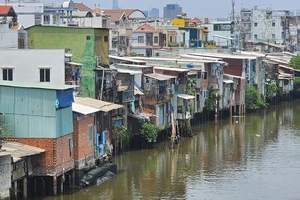
The project ‘Creating an Observatory for Measuring Plastic Occurrences in Society and Environment’ (COMPOSE), launched by the French Embassy in Vietnam, reveals that in the 250.000 tonnes of plastic waste in HCMC, over 200,000 tonnes are either recycled or released directly into the environment.
More seriously, the plastic waste amount on Sai Gon River is ranked at the fifth in Vietnam, with approximately 7,500 – 13,000 tonnes per year. This leads to its microplastic quantity being 1,000 times as dense as the one in Seine River in Paris, resulting in destructive effects on the public health.
Since plastic products, particularly single-use ones, are so convenient to consumers, no one seems to take into consideration their detrimental impacts on the environment. It is high time the Government collaborated with businesses as well as the community to replace these damaging products with more sustainable ones or at least provide sufficient information about plastic types on each package for consumers to wisely choose suitable merchandise.
HCMC People’s Committee has, therefore, released a detailed plan for plastic waste management, recycling, and reduction.
Accordingly, at the end of 2021, all supermarkets and department stores in the city use eco-friendly packaging instead of popular hard-to-deteriorate plastic bags. Traders in traditional markets are encouraged to reduce plastic bag selection by 50 percent.
State agencies and organizations must actively take the lead in limiting and recycling plastic waste, avoid hard-to-decompose plastic packaging and single-use plastic products (e.g. bottles, jars, straws, foam boxes) in meetings, limit the use of single-use banners, slogans while switching to electronic ones in campaigns.
In order to fulfill this goal, Vice Chairman of HCMC People’s Committee Le Hoa Binh has already requested related state agencies, units, departments to develop a common action plan, focusing on waste control at source and avoidance of hard-to-decay plastic packaging, single use plastic merchandise in daily operation.
Meanwhile, the localities should encourage hotels, restaurants, tourist resorts, companies, manufacturing plants in their areas to reduce plastic waste release. Instead, eco-friendly recycled products are more widely promoted. Any plastic waste from tourism activities, marine services, maritime economy, marine mineral resources, aquaculture and fishing must be collected and transported to waste processing units properly.
Simultaneously, HCMC boosts the recycling of plastic waste via the application of the 3T model (or 3R in English: Reduce – Reuse – Recycle). The local authorities must offer favorable conditions for capable organizations to carry out plastic waste collection and recycling services in the city.
Finally, the municipal authorities will increasingly monitor and punish any violation of the environment law like indiscriminate disposal of waste and plastic waste in public places, illegal avoidance of environment protection tax, value-added tax, business income tax in importing, manufacturing, distributing and trading hard-to-decompose plastic packaging and single-use plastic products.
Recycled and eco-friendly merchandise and materials are more widely encouraged in daily operations of businesses.
























